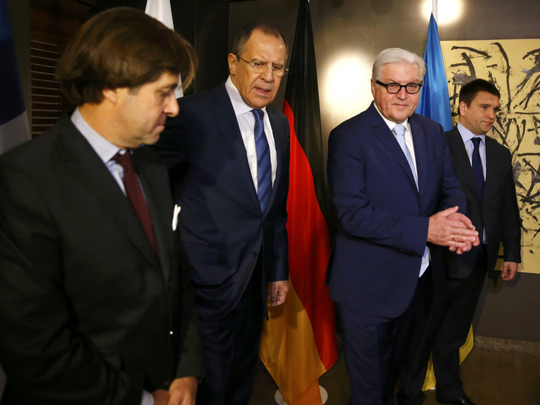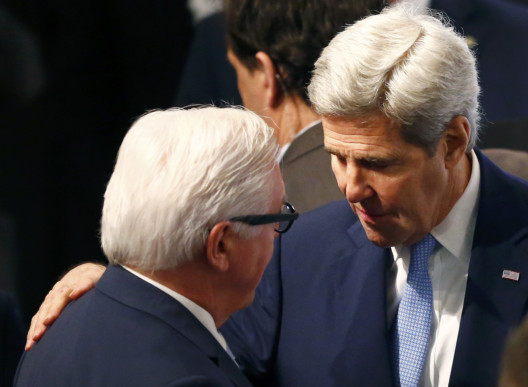
The United States, Russia and the other 19 powers trying to make peace in Syria announced on Thursday that they’d reached a ceasefire agreement. But a close look at the document reveals no real ceasefire and persistent disagreements on key issues.
The US Secretary of State, John Kerry, said at a press conference in Munich that the “cessation of hostilities”, which will begin in a week, does not apply to the fight against Daesh (the self-proclaimed Islamic State of Iraq and the Levant) and the other main terror group, Jabhat Al Nusra. But that is not quite what the document says. The document says that the pause in fighting — and the signatories’ support for “the agreement and implementation of a nationwide ceasefire” — does not apply to Daesh, Jabhat Al Nusra “or other groups designated as terrorist organisations by the United Nations Security Council”.
Here’s the thing: The UN Security Council’s members are still divided on which groups in Syria to tag as “terrorist”. In line with Kerry’s remarks, the US defines the term to include Daesh and Jabhat Al Nusra. But Russia broadens its coverage to any group fighting on the ground in Syria, other than the Syrian army and its allies.
In other words, Russia (and Iran and Syria, among others) could properly read the document as allowing the fight to continue not only against Daesh and Jabhat Al Nusra, but also against the Kurds, the various US-supported rebels and any armed group that opposes the Syrian military or threatens Syrian President Bashar Al Assad’s regime.
Meanwhile, to the extent that the deal results in a genuine ceasefire, it locks in the territorial gains that Syrian army troops — backed by Russian air strikes — have recently made in Aleppo and will thus allow them to consolidate their control without worrying about fire from insurgents.
This may explain the timing of the agreement and the Russians’ eagerness to sign it.
However, this political aspect of the deal will probably also prove to be its unwinding, as several anti-Al Assad forces — and their backers in Turkey and elsewhere in the region — are unlikely to lay down their arms and submit to renewed oppression from Damascus, just because the International Syria Support Group (the formal name of the assembly of nations and blocs that signed the deal) asked them to do so.
The deal isn’t entirely cynical or useless. It sets up arrangements and security guarantees for humanitarian aid to reach the most besieged areas of Syria. And it may be that the Russians really are keen to wrap up their military operation — not just because they’ve reaped some gains for Al Assad, but because it has stretched their capacity for this sort of intervention to nearly the breaking point. At this point, the war itself is prolonging the political and humanitarian crisis, in the Middle East and — through the flood of refugees — beyond. Anything that brings relief from its incessant ravages is a good thing, quite apart from geostrategic factors.
Yet, in the medium-to-long run, the failure to unseat Al Assad will undo any temporary ceasefire (which is the most that anyone is claiming for the deal anyway). The agreement does reiterate earlier timetables for a “political transition” to “credible, inclusive and non-sectarian governance” as well as free elections and the drafting of a new constitution. But the terms of this transition — the participants in the government, the rules of elections, the drafters of a constitution — are far from settled.
It’s an accomplishment, and perhaps the one sign of hope, that the foreign ministers of such diverse powers — including not just the US and Russia, but also Iran, Iraq, Saudi Arabia, Oman, Turkey, Jordan, the Arab League, the Organisation of Islamic Cooperation, the European Union, the United Kingdom, China, and others — can sit down and agree on any document that expresses even the loosest commitment to settling such an intractable conflict.
But in this case, the commitment is very loose and the ceasefire it sets forth is riddled with so many pockets of permissible violence that it’s barely worthy of the name.
— Slate/New York Times News Service
Fred Kaplan is Slate’s War Stories columnist, a fellow at the New America Foundation and author of the forthcoming book The Insurgents: David Petraeus and the Plot to Change the American Way of War.













